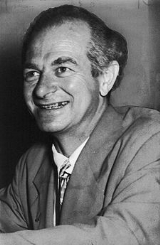
, biochemist
, peace activist
, author
, and educator. He was one of the most influential chemists in history and ranks among the most important scientists of the 20th century. Pauling was among the first scientists to work in the fields of quantum chemistry
and molecular biology
.
Pauling is one of only four individuals to have won more than one Nobel Prize
. He is one of only two people awarded Nobel Prizes in different fields (the chemistry and peace prizes), the other being Marie Curie
(the Chemistry and Physics prizes), and the only person awarded two unshared prizes.
Pauling was born in Portland, Oregon
, as the first-born child of Herman Henry William Pauling (1876-1910) and Lucy Isabelle "Belle" Darling (1881-1926).
The only sane policy for the world is that of abolishing war. ![]()
I have always wanted to know as much as possible about the world.![]()
Only when I began studying chemical engineering at Oregon Agricultural College did I realize that I myself might discover something new about the nature of the world.![]()
What astonished me was the very low toxicity of a substance that has such very great physiological power. A little pinch, 5 mg, every day, is enough to keep a person from dying of pellagra, but it is so lacking in toxicity that ten thousand times as much can [sometimes] be taken without harm. (word in brackets added)![]()
"I have something that I call my Golden Rule. It goes something like this: 'Do unto others twenty-five percent better than you expect them to do unto you.' [Pause.] The twenty-five percent is for error."![]()

